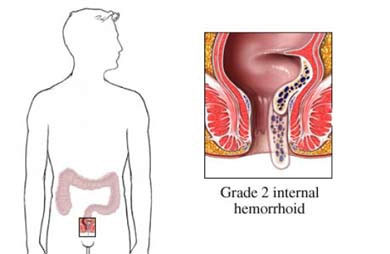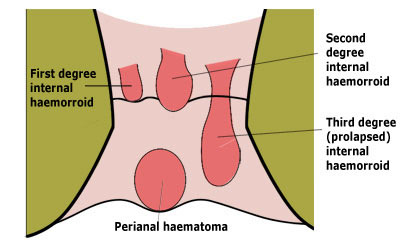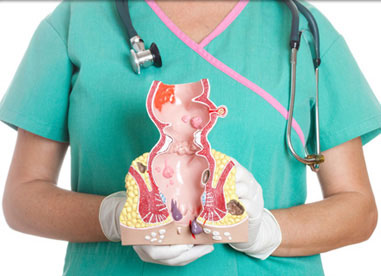Haemorrhoids which are also know as piles are characterized by bleeding while passing stool. Main symptoms are bleeding while passing stool and lump feeling around the anal canal. Symptoms of haemorrhoid vary depending on the grade. Here is a list of grades and symptoms of haemorrhoid.What are the symptoms of haemorrhoids?
There are several signs of haemorrhoids: bleeding while passing stool; discharge; itching and soreness around the anus; pain; lump feeling around the anal canal.
What are the grades of haemorrhoids?
Haemorrhoids are characterised in four grades, let us take a look at them.
Grade 1: Mild Case
Symptoms: Bleeding, discomfort
Signs: Haemorrhoids visible by proctoscopy, which may protrude while straining but which are not prolapsed
Grade 2: Moderate Case
Symptoms: Bleeding, discomfort and pruritus
Signs: Prolapse visible at anal opening during straining efforts, but with spontaneous return to normal place when straining ends
Grade 3: Severe But Treatable
Symptoms: Bleeding, discomfort, pruritus and soiling
Signs: Prolapse requires manual replacement with finger
Grade 4: Severe - May Require Surgery
Symptoms: Bleeding, pain, soiling, and discharge pruritus
Signs: Irreducible prolapsed
What are the causes of haemorrhoids?
Haemorrhoids are caused mainly due to the excessive pressure on the rectum. The pressure on the rectum can be caused due to various reasons. Below mentioned are some of the
causes due to which excessive pressure may be exerted on the rectum.
- Obesity or excessive weight gain.
- Strain caused due to hard bowel movements.
- Using the toilet for longer time or sitting in one place for a longer time.
- Faulty diet with low fibre.
- Severe diarrhoea or constipation.
- Rectal surgery.
- Anal sex.
- Pressure of growing foetus in the womb during pregnancy.
- Injury to the spinal cord.
- Colon cancer.
What are the common signs and symptoms of haemorrhoids?
Listed below are some of the common signs and symptoms of haemorrhoids.
- Bleeding from anal region which can be seen on stools, commode or toilet paper.
- Pain while passing stools.
- Itching and swelling near anus.
- Development of painful lumps in anus.
- Difficulty in sitting comfortably due pain in anus.
When the above symptoms are observed you must consult your doctor immediately. Do not let the symptoms become sever. You must immediately report to your doctor if you experience very heavy bleeding, discharge of blood clots, blood in stools, stools of unusual colour etc.
What are the ways to prevent haemorrhoids?
If you want to
prevent haemorrhoids, you must drink plenty of water and include fibrous foods in your diet. Take a walk at regular intervals if you have to sit for a longer time. Do not miss emptying your bowel when you feel the urge to pass stools. Make sure that your bowel movements are regular and avoid putting too much of pressure while passing the stools. Following
healthy lifestyle can help to prevent problems like haemorrhoids to a greater extent.
How are haemorrhoids treated?
Haemorrhoids can be treated with the help of surgical and non-surgical methods. Non-surgical methods like sclerotherapy, rubber band ligation, laser or infrared coagulation are used in order get the haemorrhoids to shrink. If these methods are not useful, surgical methods like haemorrhoidectomy or haemorrhoid stapling are used to remove haemorrhoids.
Individuals who have family history of haemorrhoids and who follow unhealthy lifestyle are more susceptible to such problems. When problems like haemorrhoids occur, it is a must to take immediate action by consulting a doctor. If right action is not taken at right time, it may lead to severe problems. Therefore, such problems must be reported to the doctor during the initial stage itself instead of opting for self-treatment.





























